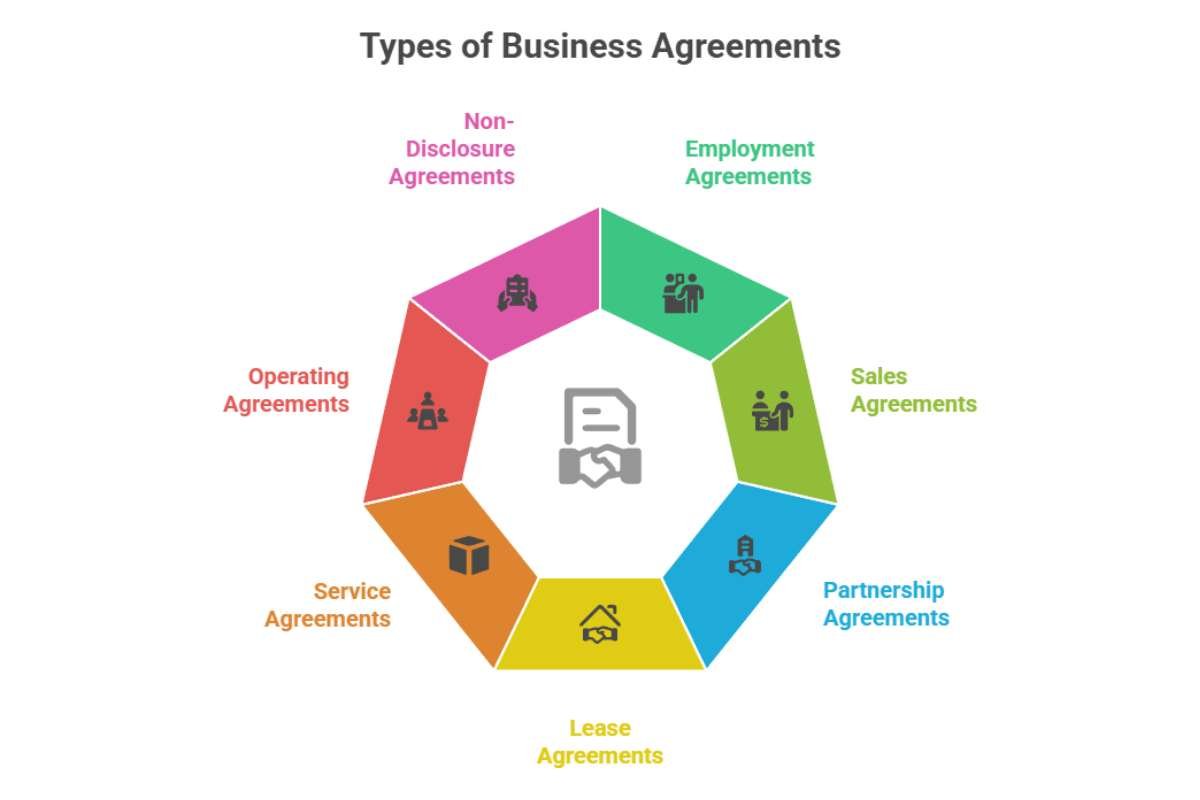You Won’t Believe These Shocking Business Agreement Mistakes Even Pros Make
You Won’t Believe These Shocking Business Agreement Mistakes Even Pros Make
Blog Article

Ever feel that moment of excitement, the handshake sealing a new venture, a fresh partnership, or a crucial deal? That feeling, that commitment, often finds its solid form in a business agreement. There is a misconception about it as a dusty legal document, but Business Agreement Mistakes can cause unnecessary complications if overlooked. It is more of a handshake that seals that initial enthusiasm and also helps get a clear understanding of how you’ll work together, protect each other, and make sure everyone agrees before proceeding on the journey ahead. It’s about laying a firm foundation, not just for today’s venture, but for a healthy and thriving relationship down the line with your business partner.
A well-crafted business contract is not just about creating walls, but it is about building bridges of understanding and trust to ensure everyone navigates the exciting and sometimes challenging landscape of business together. But though we are cautious about everything, including any legal activities regarding any venture, everyone makes some rookie mistakes, which we need to identify first. Avoiding any mistakes in the business contract could make the sealing deal and running the venture smoother and efficient.
In this article, we will understand what a business agreement is and what impact it has on any business deal. We will also highlight a few common Business Agreement Mistakes that professionals often encounter, helping you recognize and avoid them to ensure smoother negotiations and stronger agreements.
What is a Business Agreement?
A business agreement, also known as a business contract, is a legally binding agreement between two or more parties, outlining the terms and conditions of their professional relationship. It helps understand the role and responsibilities, with expectations of each party. This also helps in clarifying expectations and avoiding any misunderstandings. A business contract can be verbal, but the parties usually prefer agreements for clarity, enforceability, and to avoid disputes.
So, the main purpose of any business contract is to establish the framework for a business transaction, collaboration, or relationship. They can cover various aspects, like sales, services, partnerships, or even employment. These agreements have various types depending on the requirement and situation. Here are a few common types listed below.
Types of Business Agreements:

- Employment Agreements
- Non-Disclosure Agreements (NDAs)
- Sales Agreements
- Partnership Agreements
- Lease Agreements
- Service Agreements
- Operating Agreements
Also Read: Business Collaboration 101: Joint Ventures vs Partnerships
Common Business Agreement Mistakes to Avoid in Deals:

1. Vague Language
Often referred to as the “silent killer” of agreements, vague language may seem harmless at first, but can result in serious interpretation issues down the road. When key terms or obligations are left open to interpretation, each party may walk away with a different understanding, setting the stage for conflict. Even experienced professionals, who assume a shared context or understanding, can fall into this trap.
2. Incomplete or Missing Key Terms
Omissions often arise from over-reliance on contract templates or a narrow focus on general terms. Critical elements, such as deadlines, deliverables, payment structures, or performance benchmarks, can be inadvertently left out. These gaps may seem minor initially, but can become major stumbling blocks when obligations aren’t spelled out or expectations aren’t aligned.
3. Ignoring Intellectual Property Rights
This is particularly risky in partnerships, joint ventures, or any collaborative work involving creative assets or proprietary tools. If ownership of intellectual property (IP) isn’t explicitly defined, who owns what, how it can be used, and what happens upon termination, disputes can easily arise. This is an area that is too often overlooked until it’s too late.
4. Weak or Missing Termination Clauses
A good contract not only defines how things will work while the relationship is healthy but also anticipates how they will end if things go wrong. Without a clearly defined termination clause, specifying under what circumstances the contract can be ended, with how much notice, and what the consequences are, both parties may find themselves trapped in an unworkable situation or mired in a messy exit.
5. Lack of a Clear Dispute Resolution Mechanism
Disagreements are not just possible; they’re probable. Failing to include a dispute resolution clause leaves parties scrambling in the event of conflict, which often means expensive and prolonged litigation. Whether through mediation, arbitration, or another method, pre-defining how conflicts will be handled can save time, money, and relationships.
6. Inadequate Indemnification Clauses
Indemnification is about allocating risk. If the contract doesn’t clearly outline who bears responsibility for various types of losses, damages, or third-party claims, one party may be unfairly exposed. Boilerplate indemnity clauses are often inserted without much thought, but they should be tailored to the specific risks and realities of the agreement.
7. Overlooking Data Privacy and Security
In today’s digital-first business environment, contracts that involve the exchange or storage of personal or sensitive data must address data privacy and cybersecurity measures. This includes compliance with data protection regulations (like GDPR or CCPA), protocols for data breaches, and responsibilities for data handling. Neglecting this can not only result in legal trouble but also reputational damage.
8. Not Considering the Entire Agreement (Integration Clause Issues)
Oral promises, informal emails, or side discussions can create false assumptions if they aren’t incorporated into the written agreement. An integration clause clarifies that the written contract is the final and complete agreement, superseding all prior discussions. Overlooking this can lead to arguments about what was or wasn’t promised.
9. Failing to Review and Update Regularly

10. Not Seeking Legal Counsel (or Ignoring It)
Attempting to draft or negotiate complex agreements without qualified legal input can be a costly misstep. While it may seem like a way to save money upfront, the long-term consequences of a poorly drafted or misunderstood contract can far outweigh the initial savings. Even professionals with deep business acumen benefit from having contracts reviewed by legal counsel to identify hidden risks or gaps.
Also Read: Business Negotiation Book: A Guide to Mastering the Art of Deal-Making
Conclusion
A Business agreement can be a useful tool, which will safeguard the ethics of the business and ensure that everyone is bound by proper rules and regulations. This helps both parties to clear misunderstandings and increase trust, and enhance partnership. This ensures an equal distribution of responsibilities, minimising the risk of compliance problems. A business agreement helps maintain a healthy and thriving relationship down the line with your business partner.However, sometimes Business Agreement Mistakes can prevent things from working as smoothly as expected. One can avoid certain mistakes by checking the business contract. So, with the list of mistakes given above, you can rectify your shortcomings and make sure that the deal goes as planned.
FAQ:
1. What is the meaning of a B2B agreement?
A B2B contract is an agreement between two entrepreneurs (business-to-business). The parties involved can be sole proprietors and commercial companies, such as LLCS.
2. Who can write a business agreement?
Legally binding contracts are extremely important because they protect the interests of your business and define the relationship between parties. Although many attorneys are skilled in drafting legally valid contracts, it is possible for you, as a small business owner, to draft your own.
3. What is an agreement and its types?
An agreement is an understanding between parties. That understanding should consider the responsibilities and obligations of both parties.